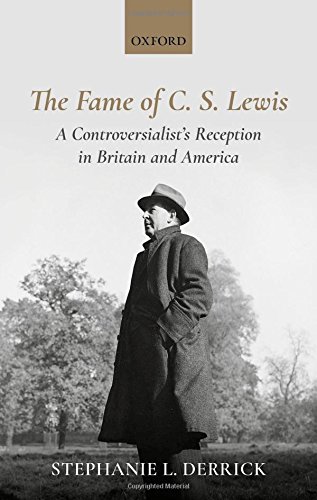A Book Review from Books At a Glance
By Andrew J. Spencer
There are two perennial questions in C. S. Lewis studies that scholars must perpetually wrestle with. First, why is Lewis still as popular as he is? Many of his books remain lucrative backlist sellers for those publishers fortunate enough to hold rights to his work. Second, why has the popularity of Lewis differed so significantly between the United States and Britain? Historian Stephanie Derrick attempted to answer those questions in her doctoral dissertation and has repackaged that scholarly work into The Fame of C. S. Lewis.
After her introduction, Derrick tackles the contours of interest in Lewis in five chapters. The first chapter summarizes Lewis’ biography, a necessary task even in a book more about the reception of an author’s work than the author himself. The portrait Derrick chooses to paint is of a contentious man who found an outlet for his contrarian voice during the crisis of World War II and remained in the spotlight by maintaining that persona in the public eye. In Chapter Two, Derrick discusses Lewis’ relationship with his academic peers. Here she seeks to show that the relative cold reception of Lewis in the university was due more to his argumentative personality than his work in popularizing theology or defending orthodox Christianity. Derrick seems to place more weight on his peers’ reactions to the way that he resisted modernism, rather than the content of his resistance.
The third chapter details the popular reception of Lewis on either side of the Atlantic is the post-war years. Derrick explains his greater enduring popularity among Americans by their ignorance, while the British appreciation of Lewis dimmed due to his inconsistency with the contemporary trends in the political climate. Derrick’s argument emphasizes the relative sophistication of the British audience over the religious populism of the US, which was more tolerant of Lewis’ strong writing. The explanation for the differences in Lewis’ popularity between the US and UK is not a flattering one for Americans, and it fails to consider other possible reasons for the differences like Lewis’ opposition to socialism, the fact that American scholars who disliked him could largely ignore him while those from the UK felt they had to respond, and the perception caused by Lewis’ attacks on the growing unorthodoxy in the state church.
Chapter Four details the publication history and various film adaptations of Lewis’ works. This chapter is worth the price of the book, as Derrick navigates many of the contours that help explain how appreciation of Lewis extends even beyond his religious supporters. The fifth chapter attempts to show that differences in Lewis’ reception have more to do with believe in a mythical, sanitized Lewis as opposed to a realistic understanding of the false persona that the British were more in tune with. Here Derrick seems to conflate the sometimes-hagiographic portraits of Lewis presented by some biographers (even some who knew him well) with the more careful criticism of Lewis’ work that are common in academic societies dedicated to Lewis. There are clearly divergent understandings of C. S. Lewis, but the origin and cause of those need more careful consideration. The conclusion of the volume summarizes the work of the preceding pages, but also ventures into other controversies surrounding Lewis, like the cause of his repeated failure to obtain a professorship at Oxford, with which Derrick generally deals insufficiently.
Throughout this largely expository volume, Derrick argues a sub-thesis that the Lewis that appears in his published works is fundamentally different than the real C. S. Lewis. She repeatedly refers to “the persona he adopted as a controversialist” (e.g., p.78) or similar language, as opposed to a different Lewis that she believes to have been the authentic one. She cites evidence like the disparity between the emotionally subdued reaction he seemed to have to his wife’s death to some who interacted with him in contrast to the raw anguish evident in the pseudonymously published A Grief Observed. Derrick also claims that in light of the false persona of his published work, they should be read ironically. Meanwhile, Derrick uses secondary comments about Lewis to paint a portrait of Lewis as “opportunistic” and using “showmanship” to take “advantage of [American] naivety to make some money.” (p.95) Derrick’s insinuations are poorly supported by a fair reading of Lewis’ voluminous correspondence, the common witness of a wide range of his friends and even critical biographers, and stubborn truths like Lewis’ donation of the majority of the proceeds of his writing to a charity, his voluminous correspondence with thousands of fans and friends that is generally consistent with his supposed false persona, and the fact that he obviously did not take advantage of his popularity to capitalize in many cases. In other words, despite the excellent research Derrick has done for other aspects of the book, the false-Lewis narrative she invents does not withstand much scrutiny and mars an otherwise helpful book.
Despite the questionable thesis about Lewis’ personality in this text, there is much to be commended in Derrick’s first book. As she declares in her introduction, she has done extensive research for the book, traveling to the various repositories of Lewisiana in the United States and Britain. She was instrumental in the recent rediscovery of two ‘lost’ articles by C. S. Lewis. Her work on the publication history of Lewis’ most popular books and stories of the various attempts at adapting those same volumes for the screen make this volume a useful contribution to the ongoing critical conversation about the work and legacy of C. S. Lewis.
Andrew J. Spencer (PhD, Southeastern Baptist Theological Seminary) lives in Monroe, MI. He is the editor of the forthcoming book, The Christian Mind of C.S. Lewis (Wipf & Stock, 2019), and frequently writes at EthicsAndCulture.com.
